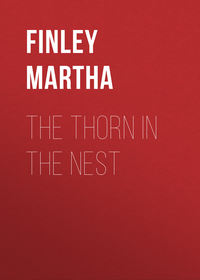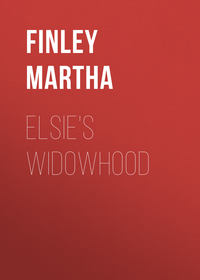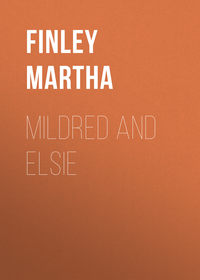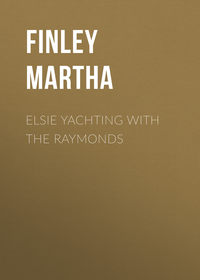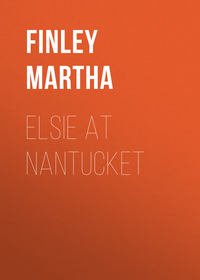
Elsie at Viamede
Mrs. Dinsmore, Mrs. Travilla, and Mrs. Raymond sat together, busy with fancy work and chatting cheerily, while the younger ones had their drawing materials or books – except Grace, who was dressing a doll for little Elsie. Few of them, however, were accomplishing a great deal, there being so small necessity for the employment and so many things to withdraw their attention from it.
Max speedily made his way to Mrs. Travilla's side. She looked up from her work, and greeted him with her sweet smile. "It is quite delightful to have you among us again, my dear boy," she said, taking his hand and pressing it affectionately in hers.
"Thank you, dear Grandma Elsie," he returned, his eyes sparkling; "it is a great pleasure to hear you say so, though I don't know how to believe that you can enjoy it half so much as I do."
"I am glad to hear that you do, laddie," she said brightly. "Now suppose we have a bit of chat together. Take that camp chair by your grandmother's side and tell her how you enjoy that artillery exercise you have just been going through."
"Thank you, ma'am," said Max laughingly, as he took the seat indicated. "It's really delightful to be treated as a relative by so dear and sweet a lady, but you do look so young that it seems almost ridiculous for a great fellow like me to call you grandma."
"Does it? Why, your father calls me mother, and to be so related to him surely must make me your grandmother."
"But you are not really old enough to be his mother, and I am his oldest child."
"And begin to feel yourself something of a man, since you are not called Max, but Mr. Raymond at the Academy yonder?" she returned in a playfully interrogative tone.
Max seemed to consider a moment, then smiling, but blushing vividly, "I'm afraid I must plead guilty to that charge, Grandma Elsie," he said with some hesitation.
"What is that, Max?" asked his father, drawing near just in time to catch the last words.
"That I begin to feel that – as if I'm a – at least almost – a man, sir," answered the lad, stammering and coloring with mortification.
"Ah, that's not so very bad, my boy," laughed his father. "I believe that at your age I was more certain of being one than you are – really feeling rather more fully convinced of my wisdom and consequence than I am now."
"Were you indeed, papa? then there is hope for me," returned the lad, with a pleased look. "I was really afraid you would think me abominably conceited."
"No, dear boy, none of us think you that," said Mrs. Travilla, again smiling sweetly upon him. "But you have not yet answered my query as to how you enjoyed the artillery exercise we have just seen you go through."
"Oh, I like it!" returned Max, his eyes sparkling. "And I don't think I shall ever regret my choice of a profession if I succeed in passing, and become as good an officer as my father has been," looking up into the captain's face with a smile full of affection and proud appreciation.
"Now I fear my boy is talking of something that he knows very little about," said the captain, a twinkle of fun in his eye. "Who told you, Max, that your father had been a good officer?"
"My commandant, sir, who knows all about it, or at least thinks he does."
At that instant there was a sound like the splashing of oars on the farther side of the vessel, and a boyish voice called out, "Ahoy there, Raymond! A message from the commandant!"
"Oh, I hope it isn't to call you back, Maxie!" exclaimed Lulu, springing up and following Max and her father as they hastened to that side of the vessel, expecting to see a row-boat there with a messenger from the Academy.
But no boat of that kind was in sight. Could it have passed around the vessel? Max hurried to the other side to make sure but no boat was there.
"Oh!" he exclaimed, with a merry laugh, "it was Mr. Lilburn," and he turned a smiling, amused face toward the old gentleman, who had followed, and now stood close at his side.
"Eh, laddie! what was Mr. Lilburn?" queried the accused. "That I'm no down there in a boat is surely evident to all who can see me standing here. Are ye no ashamed to so falsely accuse an auld friend who wad never do harm to you or yours?"
Then a voice seemed to come from a distant part of the vessel. "Ah, sir, ye ken that ye're known to be up to such tricks. All only to make fun for your friends, though, not to cause fright or harm to anyone – unless it might be a gambler or some other rascal."
"Hear that, now, cousin!" cried Mr. Lilburn. "Somebody seems ready to do justice to the auld man our fine young cadet here is so ready to suspect and accuse."
By this time all the other passengers had joined them, everybody but the very little ones understood the joke, and it was received with merry peals of laughter.
To Max the afternoon and evening seemed to pass very quickly, so delightful was it to be once more surrounded by his dear ones, not the least pleasant part being a half hour spent alone with his father after the others had retired; he had so many little confidences that he would not willingly have shared with anyone else, and they were heard with so much evident interest, such hearty sympathy, and replied to with such good and kindly advice. Max was even more firmly convinced than ever before that such another dear, kind, and lovable father as his was nowhere to be found.
And, by the way, the captain was almost equally sure that no other man had a son quite so bright, handsome, intelligent, noble, industrious, and in every way worthy to be the pride of his father's heart, as this dear lad who was his own.
"God, even the God of his fathers, keep my dear boy in every hour of trial and temptation, and help him to walk steadily in the strait and narrow way that leads to everlasting life," he said with emotion when bidding his son goodnight. "Keep close to the dear Master, my son, ever striving to serve and honor him in all your words and ways, and all will be well with you at the last."
CHAPTER XVII
The captain, Max, and Lulu were all three early on deck the next morning – as lovely a May morning as ever was seen. The sun had but just showed his face above the horizon when Lulu mounted the companion-way to the deck, but she found her father and brother already there, sitting side by side, both looking very happy and content.
"Good-morning, papa and Max," she said, hurrying toward them.
The salutation was returned by both in cheery, pleasant tones.
"I thought I'd be the very first on deck; but here you both are before me," she added as she gained her father's side.
"But pleased to have you join us," he said, drawing her to a seat upon his knee. "A sweet Sabbath morning, is it not? And how did my little girl sleep?"
"As well as possible, thank you, papa. It is much cooler here than at Viamede now, and a delightful breeze came in at the window. But I almost always sleep well, and that is something to be thankful for, isn't it?"
"It is, indeed," he responded. "May my dear eldest daughter never be kept awake by the reproaches of a guilty conscience, cares and anxieties, or physical distress; though that last I can hardly hope she will escape always until she reaches that blessed land where 'the inhabitant shall not say, I am sick.'"
"Yes, sir," she said, "I ought to be very thankful that I am so healthy; I hope I am; but any kind of physical pain I have ever been tried with is far easier for me to bear than the reproaches of a guilty conscience. I can never forget how hard they were to endure after I had hurt dear little Elsie so because I was in a passion."
"I can't bear to think of that time," said Max; "so let us talk of something else. The view here is lovely, is it not, papa?"
"Oh," cried Lu in surprise, "we are at anchor again in the river at Annapolis, aren't we, papa?"
"Yes; I brought you all back here in the night, to spend the Sabbath. I think we will go into the city to church this morning, and have some religious exercises on the vessel this afternoon and evening."
"Oh, I like that plan, papa," said Max, "especially the afternoon part, for I am really hungry for one of those interesting Bible lessons with you for my teacher."
"Yes, Maxie, I pity you that you can't share them with Gracie and me every Sunday," said Lulu. "Papa, won't you give us – Max and Gracie and me – a private Bible lesson all to ourselves after the service for the grown folks, sailors and all, has been held, just as you used to do when we were all at home at Woodburn?"
"Quite willingly, if my children wish it; indeed, it is what I had contemplated doing," replied the captain; "for we cannot better employ the hours of the holy Sabbath than in the study of God's Word, which he has given us to be a 'lamp to our feet and a light to our path' that we may journey safely to that happy land where sin and sorrow are unknown.
"Never forget, my children, that we are but strangers and pilgrims upon this earth, only passing through it on our way to an eternal home of either everlasting blessedness or never ending woe – a home where all is holiness, joy, peace, and love, or to that other world of unending remorse and anguish, 'the blackness of darkness forever.'"
"It is very difficult to keep that always in mind, papa," said Max. "I hope you will often ask God to help us – me especially – to remember it constantly, and live, not for time, but for eternity."
"I do, my dear boy; there is never a day when I do not ask my heavenly Father to guard and guide each one of my dear children and give them a home with him at last. But we must all strive to enter in at the strait gate, remembering the warning of Jesus, 'Strait is the gate, and narrow is the way, which leadeth unto life, and few there be that find it.'"
Violet joined them at that moment, then the rest of the party, one after another. Then came the call to breakfast; and soon after leaving the table, and the holding of the regular morning service on the vessel, nearly everyone went ashore and to church.
At the close of the exercises there, they returned to the Dolphin, dined, a little later assembled under the awning on the deck, and being presently joined by the greater part of the crew, another short service, consisting of the reading of the Scriptures, with explanatory remarks, prayer, and the singing of hymns, followed.
After that, the captain took his three older children aside and gave them, as in the dear old times at Woodburn, a Bible lesson, in which they were free to ask of him as many questions as they would.
"Papa," said Grace, "I was reading in Isaiah this morning this verse, 'Therefore, thus saith the Lord God, Behold I lay in Zion for a foundation, a stone, a tried stone, a precious corner-stone, a sure foundation.' Does it mean the dear Lord Jesus, papa?"
"Yes, daughter; in both the Old and New Testaments Christ Jesus is called a Foundation. The foundation of a building is the part that supports all the rest; and that Jesus is to all his Church, his people. He is the foundation of all the comforts, hopes, happiness of the Christian; the foundation of the covenant God has made with his Church; the foundation of all the sweet and precious promises of God's Word; a sure foundation on which his people may securely rest, knowing that he will never deceive, fail, or forsake anyone who trusts in him. He is the only Saviour, the head of the Church, the only Mediator between God and man.
"We are not to look too much to our feelings, doings, prayers, or even our faith, but on the finished work of Christ. We can have assurance of hope, but must attain to it by resting upon God's word of promise, remembering that it is Christ's righteousness which God accepts, not ours, so imperfect, so unworthy of mention.
"In that way only can we have peace and safety, for our own righteousness is but as filthy rags, exceedingly offensive in the sight of God, who is 'of purer eyes than to behold sin, and cannot look upon iniquity,' so utterly abhorrent is it to his holy nature.
"The Bible tells us, 'He that believeth on the Son hath everlasting life; he that believeth not the Son shall not see life; but the wrath of God abideth on him.'"
"Papa," said Grace, low and feelingly, "those are dreadful words, 'the wrath of God abideth on him.'"
"They are indeed," he said. "The one great question is, 'Do you believe on the Son of God?' There in Egypt, when God sent those plagues upon Pharaoh and his people, it was not the feelings of the Israelites that saved them, but the blood on the door-posts, symbolizing the blood of Christ, which would in future ages be offered to satisfy the demands of God's broken law; and it was when he saw that blood that the angel passed over, harming them not.
"The scape-goat too, was a type of Christ bearing the sins of the people away into the wilderness; if our sins are laid on Jesus they will come no more into remembrance before our righteous Judge, but covered with the beautiful robe of his righteousness, God will treat us as if it were our very own. Ah, my beloved children, it is the dearest wish of your father's heart that each one of you may have that righteousness put upon you!"
A slight pause; then Grace said in low, clear, and joyous tones, "Papa, I think we have. I feel that I do love Jesus and trust in him, and so do Max and Lulu, I believe."
"I do," said Max with feeling. "I know I am very, very far from perfect, but I do desire above everything else to be a follower of Jesus, and known as such; to live near him, and honor him in all my words and ways."
"My boy, nothing could have made me happier than that confession from your lips," his father said with emotion. "And it is no less a joy of heart to me to know that my dear little Grace is a follower of Jesus." He drew her nearer as he spoke, then turned loving, questioning eyes upon Lulu.
"Papa," she said in tremulous tones, "I – I feel that I am not worthy to be called one of Jesus' disciples, but I do love him, and long to grow in likeness to him. I do ask him very, very often to take away all the evil that is in me, and make me just what he would have me to be."
"And he will hear your prayer, he will grant your petition," her father replied in moved tones. "Oh, my dear children, your father's heart is full of thankfulness that he has reason to hope and believe that you are all true followers of the blessed Master, and that we may all live and love together, not in this world only, but also in the next."
To Max that delightful day and evening seemed very short. He was surprised when his father, glancing at his watch, said, "It is half past nine, my son. Say good-night and good-by to your friends here, for we must go back to the Academy. It need not be a very sad parting," he added, with a smile, "as you may expect to see some, if not all, of us next month, at the time of the commencement exercises."
"Thank you, papa; that is good news," said the lad, his countenance brightening very much, "for it is the greatest treat to a fellow to see home folks once in a while."
"I know that, my boy. I haven't forgotten the feelings of a cadet, which are pretty much like those of other lads."
The farewells were quickly spoken, father and son entered the waiting row-boat, and in a few minutes were at the Academy.
Captain Raymond bade his son good-by at the door, reminding him in cheerful tones that he might hope to see him, and perhaps the entire Woodburn family, again in a few weeks.
With that pleasant prospect in view, Max went to his room in excellent spirits. He found Hunt already there.
"Hello, Max! glad to see you back again," he exclaimed in a tone of hearty good-will. "Had a royal time of it, I suppose?"
"Delightful!" cried Max gayly; "and the best of it is that my father holds out the prospect of another visit from our whole family at the time of the June commencement, which you know is not so very far off."
"Well, I must say you're a lucky dog, Raymond," returned Hunt. "I wish I had the same prospect of seeing my folks; but they're too far off, and money's too scarce."
Violet was alone on deck when her husband returned to the yacht, the others having retired to the cabin or their state-rooms.
"Waiting for me, love?" he asked, as he stepped to her side and passed an arm round her waist.
"Yes," she said; "the air is so pleasant here, and I thought it would be really delightful for us two to have the deck entirely to ourselves for a while."
"Nothing could be pleasanter to me, dearest," he said, giving her his arm and beginning a leisurely promenade.
"And you have left Max at the Academy again?" she said interrogatively. "How manly he grows, the dear fellow! and so handsome; he's a son to be proud of, Levis."
"So his father thinks," returned the captain, with a low, happy little laugh. "My dear boy is one of God's good gifts to me."
"And how evidently he admires and loves his father – as he well may, I think. He grows more and more like you in looks, too, Levis. I can imagine that at his age you were just what he is now."
"No, my dear; if I am not much mistaken he is both a handsomer and a better lad than his father was at the same age."
"Doubtless not half so conceited and vain as his father was then or is now," she returned, with her low, sweet silvery laugh. "There must have been a vast improvement, however, before I had the happiness of making his acquaintance."
"Max's?" he queried with mock gravity.
"The acquaintance of Max's father, sir," she replied demurely. "I have known the captain now for five years, and can truly say I have never seen him show such vanity and conceit as you are pleased to charge him with, or at least to say were once among his attributes; and I will not have him slandered, even by you."
"Very well, then, let us change the subject of discourse."
"Agreed. How soon do we leave Annapolis to pursue our homeward way?"
"A little after midnight, if that plan suits my wife's wishes."
"Entirely. But you are not going to remain on deck till then?"
"Probably. I feel no inclination for sleep at present, and the air outside here is, as you remarked a moment since, delightful."
"Especially when enjoyed in such good company, I presume?"
"Yes, that makes a vast difference, of course, yet I can hardly ask you to stay very long with me; cannot have the cruelty to rob my heart's best treasure – my young and lovely wife – of her beauty sleep."
"What a gallant speech!" she laughed; "it surely deserves the reward of at least another half hour of her delectable society. Ah, my best and dearest of husbands," she added in a more serious tone, "there is nothing else in the world I so keenly enjoy as these rare times when I can have you all to myself."
"Yet I cannot believe they are ever more enjoyable to you than to me, my love," he returned; "sweet as your society was to me in the days of our courtship, it is, I think, even sweeter now. And I hope mine is not less enjoyable to you."
"Indeed, no," she said earnestly; "you seem to grow dearer and more lovable every day that we live together; a blessing far, far beyond my deserts. Oh, I can never cease to marvel that I have won so great a prize in the matrimonial lottery."
"It is wondrous strange," he returned, with a happy laugh, "that a young, beautiful girl, belonging to one of the very best families in the land, and who might have had her pick and choice among its most desirable matches, should have been able to secure a middle-aged widower with three children. You may well wonder at so great good fortune falling to your lot, lady mine," with a strong emphasis upon that last word.
"Ah, my husband, you could hardly bestow upon me a sweeter name than that," she said softly, and with a bright, winsome look up into his face. "It is so sweet to belong to you, and to have you belong to me. And then our darling children are such treasures."
"Yes; our two dear babies."
"Ah, yes; but I meant to include the others also; for I surely may claim now that even Lulu loves me, not as a mother exactly, but as a dear older sister."
"Yes, I am certain of it, dearest," he said in tones expressing heart-felt happiness; "she shows it in many ways, and however many and serious her faults may be, hypocrisy and deceit are not among them."
"No, indeed! I never knew anyone more perfectly free from those faults – so perfectly open and candid. I am sure that if her life were in peril she would not be deceitful or untrue in order to save it."
"Thank you, my love," he said with emotion. "I share that belief, and it has been a great consolation to me when sorely distressed by her very serious faults."
"But she is overcoming those under her father's wise and affectionate training."
"I think she is," he said; "she is certainly struggling hard against them, though the training you speak of, has, I fear, been far from faultless."
"Ah, you have not so much confidence in her father's wisdom as I have," returned Violet, with a smile and a look up into his face which expressed a world of loving appreciation.
The conversation then turned upon other themes not unsuited to the sacredness of the day; they seated themselves and sang a hymn or two together, then Violet went below and sought her berth, to be followed an hour later by her husband.
CHAPTER XVIII
The next morning the Dolphin's passengers, on awaking, found her speeding on her homeward way. No one regretted it, for all were full of joy at the thought of seeing home again, delightful as had been their sojourn at lovely Viamede and on the vessel.
It was still early in the day when they reached their wharf, but carriages from Ion, Fairview, and Woodburn were in waiting, conveyances for the luggage also, and in a very short time they had left the city behind, and were whirling rapidly over the familiar road toward the loved homes they had left some months before – a happy company, the younger ones full of mirth and gayety.
The grounds belonging to each estate were looking their loveliest, and the returning travelers were greeted with the warmest of welcomes. Zoe and Edward had reached Ion some days in advance of the others, and seen to it that everything there was in perfect order, while at Woodburn such matters had received careful attention from Christine and Alma.
"Welcome home, my love," the captain said to his wife as the carriage turned in at the great gates. "And you too, my darlings," addressing his children. "Is it almost as lovely here as at Viamede?"
"Oh, yes; yes, indeed, papa!" they responded, baby Ned adding, "Oh, me so blad to det home adain."
Then a joyous bark was heard, and Prince, Max's dog, came bounding to meet them.
"Oh, dere our big doggie Prince!" cried Ned, with a joyous laugh, and clapping his chubby hands. "Maxie dere too, papa?"
"No, Neddie boy; we have left Brother Maxie behind at Annapolis," answered his father; then as the carriage came to a standstill, he threw open the door, exclaiming, "Home at last!" sprang to the ground, and proceeded to hand out wife and children.
"Yes," said Violet, who, as well as the children, had been gazing with delight upon the grounds from the carriage window, "and I for one am as glad as I was to see Viamede on our arrival there. How very lovely everything is looking! Ah, Christine and Alma," as the two came hurrying out to greet the returned travellers, "I hope you are well? What good care you have taken of everything in our absence."
"Thanks, Mrs. Raymond; it is very kind in you to notice it; and we are delighted to see you all at home again," the two women returned, smiling with pleasure over the arrival and Violet's appreciative words, to which the captain added his hearty commendation, and the children glad, warm greetings.
Prince's actions, in the meantime, told the same story of his feelings; he was fawning upon one and another, capering about and wagging his tail with many a joyous bark that seemed to say, "I am very glad, very happy to see you all here again," and receiving much loving stroking and patting in return.
The servants, too, came crowding about, with smiling faces and exclamations of joy and thankfulness. "Bress de Lawd yous all safe home agin!" "We's pow'ful glad to see you, cap'n, Miss Wi'let, an' all ob de chillens!"
"Dis chile 'specs yo's pow'ful hungry, Miss Wi'let an' de res'; but de dinnah's 'mos' ready fo' to dish up," remarked the cook.


